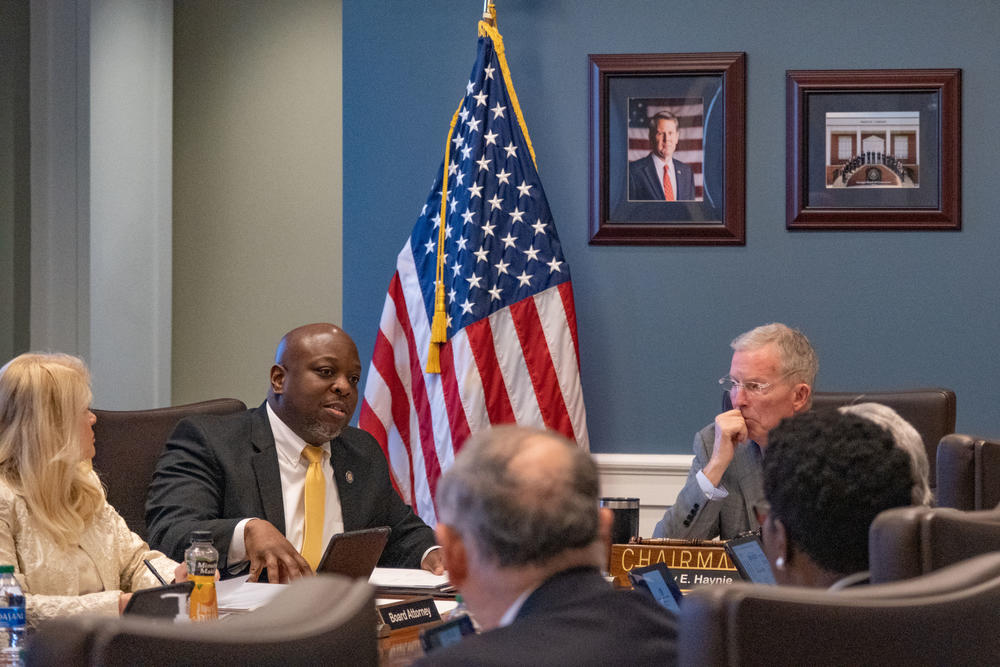
Caption
Commissioner Tyrone Oliver and Board Chairman Larry Haynie of the Georgia Department of Corrections during a monthly meeting on March 7, 2023.
A Fulton County Judge dismissed a case against the state of Georgia this week that put into question the legality of a contract for a new health care provider in the state’s prisons.
The Georgia Department of Corrections' new contract with Centurion Health will go into effect July 1. Centurion will manage physical and mental health care services for roughly 47,000 inmates.
The hearing for the lawsuit against the State of Georgia from current correctional health care provider, Wellpath, came shortly after a previous lawsuit against the Georgia Department of Corrections, Centurion and the Department of Administrative Services was also dismissed.
In the complaint, Wellpath alleged it didn’t get a fair chance to negotiate a new contract with the Georgia Department of Corrections before the agency signed a $2.4 billion deal with Centurion.
Wellpath has been providing healthcare in state prisons since 2021, and sent a notice of nonrenewal last year, saying it intended to cease service by this summer.
Judge Jane Barwick said during the hearing at Fulton County Superior Court that Wellpath will have to take up its issues with the contract with the Georgia Department of Administrative Services, which oversees state contracts and procurement.
“You terminated the contract,” Barwick told Wellpath executive Sam Britton in the courtroom. “It all started when. And whatever happens after that, we'll leave to the DOAS.”
The judge’s dismissal is based in part on Wellpath’s claim that it was left without remedy after the Georgia Department of Corrections ceased contract negotiations with the company, instead signing with Centurion.
In this case, the Georgia Department of Corrections did not post a request for proposal, something state agencies are normally required to do if services will cost over $100,000. Instead, the agency was given permission to sign with Centurion under the same bid from 2021, citing the need for an “emergency procurement” of health care services.
Attorney for the state, Jonathan Loegel, argued Wellpath is still waiting on an administrative remedy from the Department of Administrative Services on its concerns over the contract negotiations.
“If it takes two weeks, if it takes a month, it's still a pending administrative remedy that will provide the relief that plaintiff seeks,” said Loegel.
The Judge ultimately agreed.
But while the lawsuit was dismissed in court, there are ongoing concerns about how health care is provided inside Georgia prisons.
RELATED: Georgia prisons are full and understaffed. Families of the incarcerated want that message heard
In the lawsuit, Wellpath alleged that over three years, it spent $40 million of its own money to uphold the state's constitutional right to provide prisoners with adequate health care.
That includes costs associated with trauma care from instances of prison violence and addressing a systemwide backlog of sick patients, according to the complaint.
Documents included in Wellpath’s original 2021 contract provided by the Georgia Department of Corrections show a 45% increase in inpatient admissions for illness or injuries from 2016 to 2020 across state prisons. By 2020, a systemwide vacancy of around 480 healthcare providers left some prisons without a medical director or enough nurses to meet need.

Commissioner Tyrone Oliver and Board Chairman Larry Haynie of the Georgia Department of Corrections during a monthly meeting on March 7, 2023.
Commissioner Tyrone Oliver said during a meeting of the Board of Corrections in February that Georgia’s incarcerated population has become increasingly unhealthy.
“Upon intake, we're catching a lot more disease and diagnosis,” said Oliver. “Most of the people coming to our system haven't seen a physician or don't have a primary care physician.”
That’s led to increased pharmaceutical costs, he said.
Meanwhile, deaths from homicide have been steadily going up for years at the same time that the gap between the number of correctional officers and the incarcerated has continued to grow, according to an analysis of death records from the Department of Public Health. The federal Department of Justice is looking in to this too.
Before the Georgia Department of Corrections said it would stop reporting cause of death this February, homicides in Georgia prisons were on track to meet record high rates from 2023.